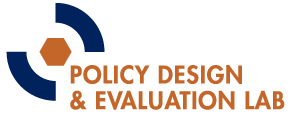Policy Design and Evaluation Lab
The Policy Design and Evaluation Lab (PDEL) is an international focal point for rigorous empirical research on the interplay of public policy, technology, and economic development.
PDEL combines advanced social science methodology with the power of information technology to design policies and programs that alleviate poverty; promote health, welfare, and security; and enhance accountability.
UC San Diego and its scholars are at the leading edge of a movement to develop a new class of solutions to some of the fundamental challenges confronting the world. Within the social sciences, these challenges include identifying the incentive systems, governance mechanisms, and policy structures that have the potential to improve the human condition.
PDEL takes advantage of UC San Diego’s strong tradition of multidisciplinary collaboration and unique collection of intellectual talents in applied social science, information and communication technology, health sciences, and environmental sciences.
PDEL’s infrastructure allows researchers to move techniques to scale in rigorous evaluations involving millions of people rather than small interventions in isolated areas.
Through its network of affiliated researchers, PDEL:
- Promotes rigorous research on social policy (randomized control trials).
- Creates interdisciplinary teams to answer tomorrow’s policy questions (union of hard science and social research).
- Advances the role of technological innovation in development engineering (SMS platforms, new approaches to mobile money, electoral transparency).
- Promotes transparency in social science research (human subjects protections, data replication services, big data instruction).
- Integrates findings into the classroom.
How do we as a society incentivize
- Teachers in third-world countries to improve the performance of their students?
- Girls in countries where HIV/AIDS is rampant to avoid risky behavior that raises their risk of contracting the virus?
- Voters to report instances of electoral fraud at polling stations?
PDEL researchers use economic, political, or social theory as a guide to imagine interventions that address a need (for example, encouraging families to send their children to school), then pilot alternative interventions (such as paying families based on school attendance versus increasing school funding), and then evaluate interventions using rigorous statistical tools applied to data collected, transmitted, and synthesized digitally.
PDEL researchers:
- Evaluate social costs and benefits of technological and institutional interventions.
- Use technology to make program evaluation dynamic, timely, and precise.
- Engage international and domestic partners with local knowledge.
- Apply collaborative approaches to problem solving.
- Deliver research results to stakeholders quickly and accurately.
- Empower citizens to monitor the performance of international public officials.
- Provide students with practical laboratory and field experience.
- Train students and young scholars to work in mixed-discipline research teams.
Research Directors
Craig McIntosh is a development economist whose expertise focuses on program evaluation. His main research interest is the design of institutions that promote the provision of financial services to micro-entrepreneurs, and he has conducted field evaluations of innovative anti-poverty policies in Mexico, Guatemala, Malawi, Rwanda, Uganda and Tanzania.
Eli Berman is chair and professor of economics at UC San Diego and co-directs the Economics of National Security group at the National Bureau of Economic Research. He is also research director for international security studies at the UC Institute on Global Conflict and Cooperation.




